Mecca’s Jo Horgan Looks Beyond ANZ for Growth
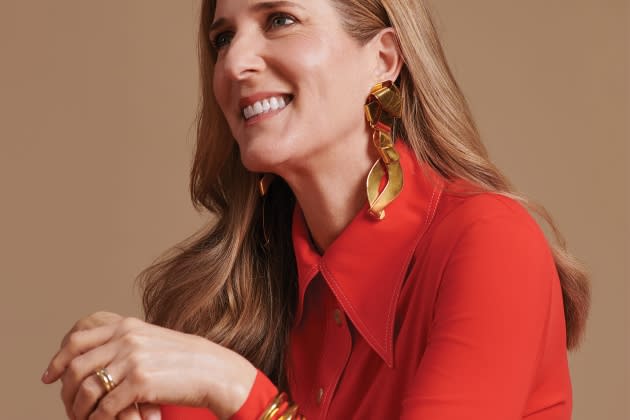
Jo Horgan has spent the last 25 years building the business she founded, Mecca, into Australia’s largest prestige beauty retailer.
But as she notches more than two decades of growth and success, Horgan has no interest in taking a victory lap.
More from WWD
Instead, she’s using the opportunity to set a big, bold goal — or BHAG (big hairy audacious goal) as she would say — for the next 25 years: global domination.
“We want to be the world’s most loved beauty destination,” said Horgan, during a wide-ranging interview with Beauty Inc. “We’ve learned over the last 25 years that if your customers absolutely love what you do and how you make them look and feel, and they want to be part of that community, you will prevail. No matter what.”
As audacious as the goal may sound, don’t bet against her, say those who know Horgan best.
“Jo Horgan is like the Biblical King David of Israel who slew Goliath with a slingshot,” said Leonard A. Lauder, chairman emeritus of the Estée Lauder Cos. who first met Horgan when he toured her stores during a trip to Australia in 2000. “Jo was brave enough to set up shop in Australia,” he continued. “Not only that, day by day, year by year, she built her brand in such a way that it is today one of the largest beauty retailers in Australia. I admire her tremendously.”
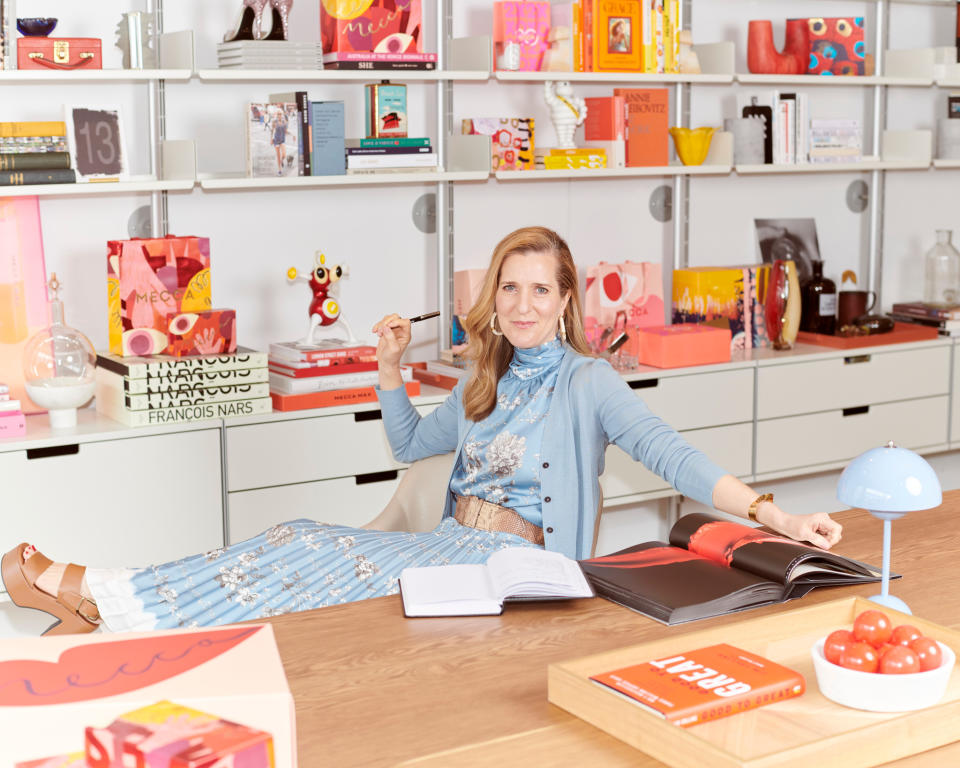
“Jo is full of enthusiasm, positive and high energy, which infuses Mecca with that same spirit,” said Masahiko Uotani, chief executive officer of Shiseido. “Mecca has been very successful in creating and delivering new ways for ANZ consumers to experience beauty and an equally strong e-commerce presence.”
The numbers bear out the accolades. Today, Mecca operates 109 stores in Australia and New Zealand and has a 25 percent share of Australasia’s 4.2 billion Australian dollar prestige beauty market; its business has grown tenfold in the last eight years since archrival Sephora set up shop and doubled over the last three years of COVID-19 — despite its home-base, Melbourne, being under lockdown for longer than any other city in the world.
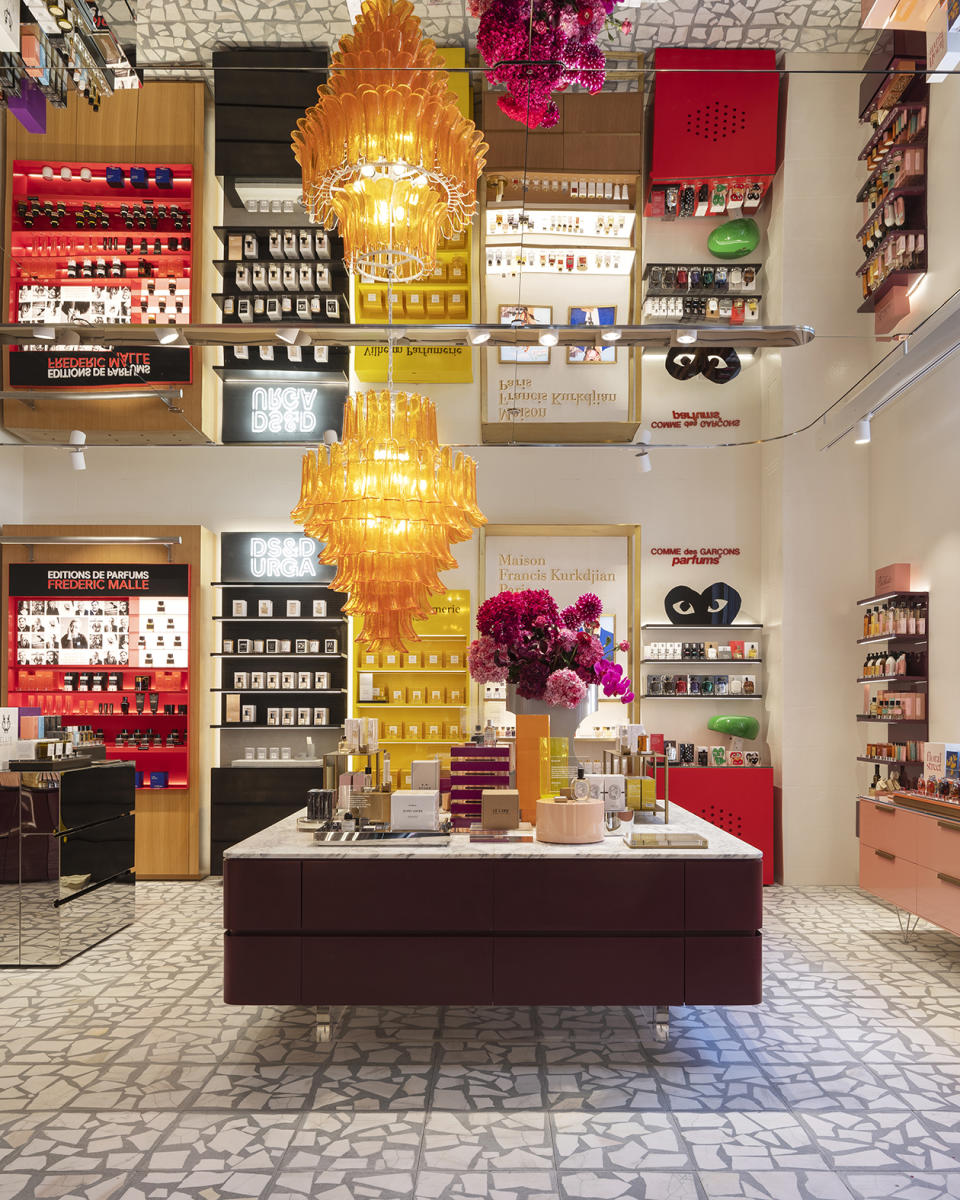
“It’s pretty incredible, what she’s done,” said Mickey Drexler, the renowned retailer who headed up Gap and J. Crew and is currently CEO of Alex Mill, who was introduced to Horgan by Lauder more than a decade ago. “I love how smart she is in business, which the results speak to, and she is always looking for the next opportunity.”
Horgan’s vivacity also permeates her approach to the business. She’s funny, self-effacing and loves to laugh, a big picture thinker who’s able to set a strategic vision for the business, rouse the teams with a rallying cry and execute impeccably. “She is full of life, she has incredible energy and she is absolutely passionate about her business and the beauty industry,” said Francois Nars, whose namesake brand has been sold at Mecca since the beginning and is today the top-ranking brand there. “She also has great taste, which translates into all of the effort she put into building Mecca. It was built on quality, great editing of the brands she carries and hard work.”
Despite her success, Horgan hasn’t lost her touch with shoppers — and it’s this that has led to her incredible success thus far and will continue to pave the way as she moves forward. “What sets Jo and Mecca apart is their deep understanding of the customer, and the consumer-centric approach they deploy across all aspects of the business,” said Charlotte Tilbury, MBE. “It goes beyond sticking brands on a shelf; everything about Mecca’s identity, from its in-store design to its omnichannel focus on education, ladders up to the idea of democratizing beauty for every customer.”
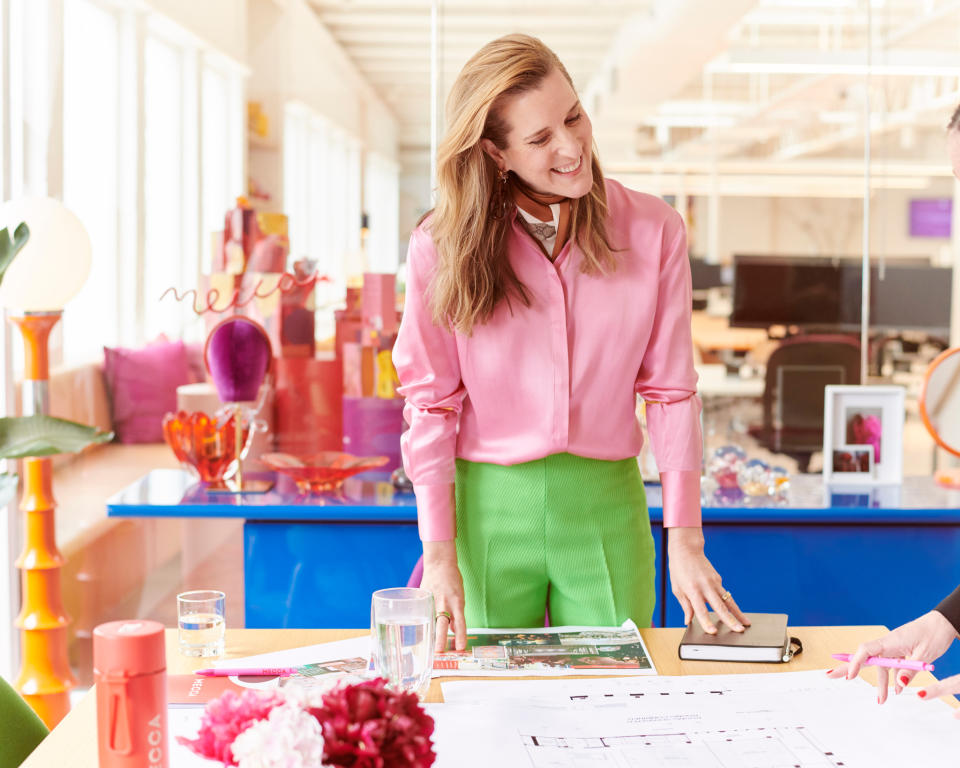
Here, as she prepares for the next phase of growth, Horgan reflects on Mecca’s role in the beauty landscape — and her plans for what’s next.
How does it feel to celebrate 25 years in business?
Jo Horgan: Amazing. Especially because during the first year, I kept thinking of the statistic that nine out of 10 businesses fail in year one, so I knew I had better be pretty focused on how I differentiated myself from the average. It’s incredibly exciting and exhilarating and slightly astonishing to look back on an action-packed 25 years of events, activities and incredible milestones. It’s the memories of the people I’ve done this with, how we’ve built it together and celebrated the highs and huddled during the lows that have made it incredible so far. And I do say so far, because I’m now looking at the next 25-year horizon and knowing what’s possible gives me enormous confidence for what Mecca can achieve in the next 25, with all of the learnings and brand relationships we have, and with the ambition, grit and determination that we have to redefine the way beauty is presented to consumers.
What’s your assessment of the global beauty business today and Mecca’s place in it?
J.H.: The business is just as exciting and exhilarating a ride as Mecca. It’s ever changing, ever innovating. If you look at 25 years ago versus now, the retail landscape has totally changed, the brand offer and category offers have multiplied out of sight, the players have diversified. Today, the customer is all-ruling. And the way customers interact with beauty has fundamentally shifted. They can access all information and all products, so retail is polarizing into either transactional convenience or absolute human connection, personalization and community. Those are the two extremes that will prevail into the future.
The other exciting thing is that beauty used to be color, skin and fragrance, and that has not just expanded into hair and body, but into health and wellness in a broad ranging and comprehensive way. That’s also going to revolutionize the industry.
What has enabled Mecca to be so successful?
J.H.: Mecca has been left alone in a corner of the globe, out of sight, out of mind, to really do what it needs to do and wants to do. As a result, we’ve been able to build an absolutely customer obsessed proposition from the outset and have been able to come up with a completely unique brand management model. We see our role as acting as a lightning rod, where we take the brand DNA and deliver it directly to customers, and because we see ourselves as absolutely responsible for building both the brand equity and the sales performance, we’ve been able to do so to this ever-growing and captive audience. We’ve crafted a globally unique model that is proven where it is equal parts customer obsession, brand service and team engagement. Would we have been able to do that if we were under the eye of everybody? I don’t know.
What percentage of the brands you sell do you act as the local affiliate for?
J.H.: Nearly 95 percent of our sales are done with brands that are exclusive and sit in the Mecca brand management model.
It’s a winning formula for the brands, for customers, for the team. Many brands have a higher brand ranking in this market than they do in any other market in the world, including their home market.
We also have, without question, the world’s most educated team. We spend over 4 percent of our turnover on education and engagement. A new team member gets over 200 hours of education in their first year. Ongoing team members receive about 80 hours to 100 hours.
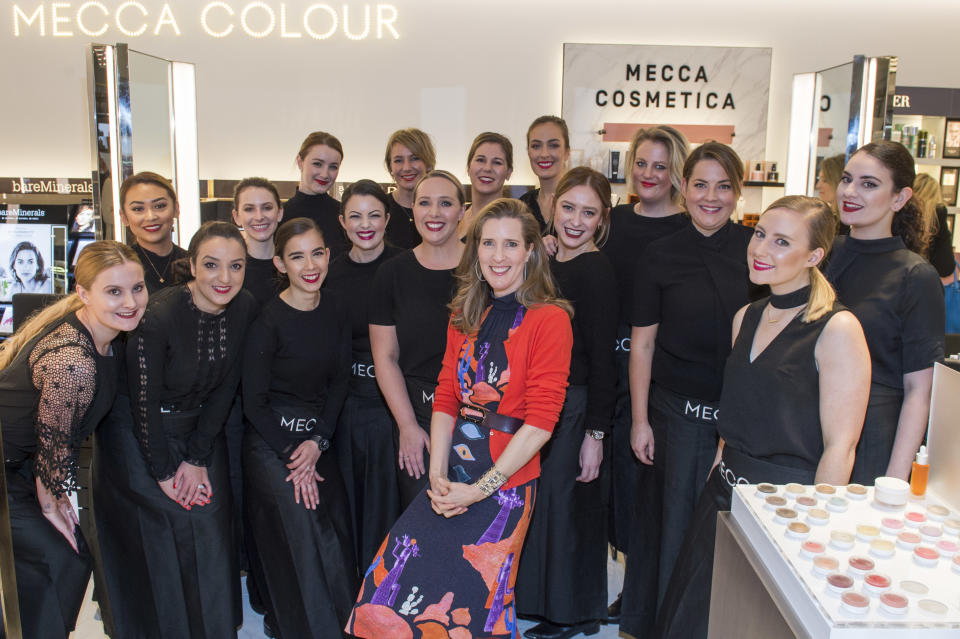
There are other ways in which we invest in our teams. We look at them as a whole — how do we educate them to be the best versions of themselves. That includes financial literacy, positive psychology, health and wellness. We bring our managers and sales team together twice a year and get extraordinary speakers, like Julia Gillard, Australia’s only female prime minister. Many of them are running businesses that might be $5 million, $10 million, $50 million doors. They’re running bigger businesses than most managing directors in Australia and it is our responsibility to prepare them for that and make sure they will thrive.
Was education always a key part of your strategy?
J.H.: When we opened our first store, we had a two-week education session for the three team members in my front living room. I used to do education sessions for two hours every second Tuesday night. I passionately believed that the ability to bring human know-how, empathy and connection to every interaction was what brought products to life. I always tell the team, a lipstick is a lipstick is a lipstick until you breathe life, hopes and dreams into it. That’s telling the story of the founder, of why they came up with that name, who’s used the product on the runway, how to use it. That’s what makes you feel like a million dollars when you put it on. The connection.
How has your vision of what Mecca is/could be evolved over the last two decades?
J.H.: I look back and on the one hand, the vision seemed so lofty that I go, “What was I thinking?” The vision was to revolutionize the beauty industry and turn the way customers interact with beauty on its head. The other side was a little more realistic: to have 10 stores doing $30 million in sales within the first five years. We verbalized our vision and purpose very early on. Our big hairy audacious goal was to be Australia and New Zealand’s number-one beauty destination whatever it takes. Our purpose — why we roll out of bed and choose this one thing to do above all other life choices — was to make people look, feel and be their best.
Now that you’ve achieved the goal to be the biggest in ANZ, what’s next?
J.H.: To mark our 25th, we went to see Jim Collins, the author of “Good to Great,” because I’ve been an absolute devotee since I first read his book in 2003. Our goal was to kick the tires and test our BHAG for the next 25 years — is it right, is it realistic, how do we get there, do we have the right business model, the right approach?
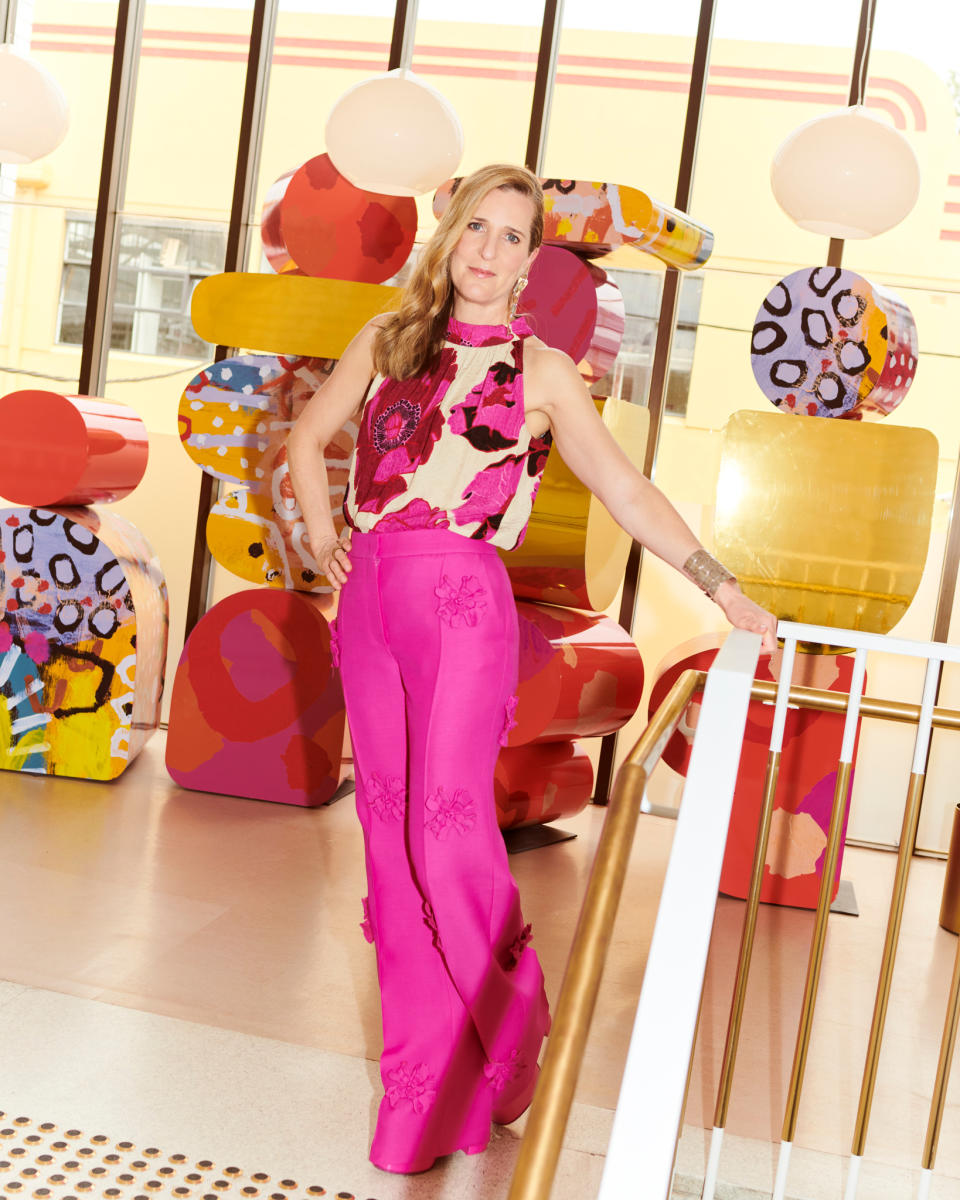
Our goal for the next 25 years is to be the world’s most loved beauty destination. One thing we’ve learned is that if your customers absolutely love what you do and how you make them look and feel, that if they want to be part of that community, you will prevail, no matter what.
Define “world” in this context.
J.H.: It was both exhilarating and slightly daunting to have the magnifying glass on the map of the world, to go from hovering over Australia and New Zealand and to step back and back and back, and go — wow, the world is a big place.
What does that mean for us? It means we need to frame our approach differently and say — if we have an offer that appeals to customers and that customers love, which seems to be the case, then it is our responsibility to take that more broadly.
How will you approach narrowing down markets?
J.H.: We’ve always tried to shoot bullets before firing cannonballs, test and trial, make small bets before really going for it. That will be our approach. We’ve done that in China, with cross-border commerce, and that has been illuminating.
We launched in August 2020, during the pandemic, and have learned some super useful things. You need to have Chinese nationals running the business and we do. You need to have boots on the ground to know the market.
What hasn’t worked is not being able to visit and to accelerate the plans at the rate we would like to, and having really lumpy data due to all of the COVID-19 restrictions.
Are you looking at Europe and the U.S.?
J.H.: Europe is a thriving market and we would clearly have to consider it along with other markets and that’s the phase we are in. We feel we have a concept that resonates incredibly strongly with customers and that drives brand equity and performance.
The U.S. is an enormous market and a holy grail market and so many brands make the pilgrimage and the road is littered with those who have faltered and failed, because it is highly competitive. As we look to see where we launch, we’ll try to make sure we choose environments in which we have the greatest confidence in which they will thrive.
Right now we’re at the lucky stage of wonderful open horizons for our dreams, hopes and aspirations to fly so we can find the fertile ground within which they can land.
Mecca has some strong brands of its own. Do you see these as the first step to conquering other markets by raising brand awareness?
J.H.: Our entire focus is customer-centric and our owned brands have been built to fill gaps that we don’t feel we can fill otherwise. Our signature line was originally built so we could do manicures and pedicures, and have product that we could get in bulk that matched at a back-bar level the type of product we were offering in our cosmetics realm. We then moved into sun care, because it is so highly regulated in Australia, and it built from there.
Mecca Max was also a clear need. We had a young aspirational customer who wanted to participate with Mecca and the price points weren’t accessible enough. We were clear we didn’t want to cannibalize existing business, which we haven’t. It is actually the number-one customer recruiter into Mecca and a very different customer profile. Our ability to trade them into Mecca’s broader offers has been another silent winning lever.
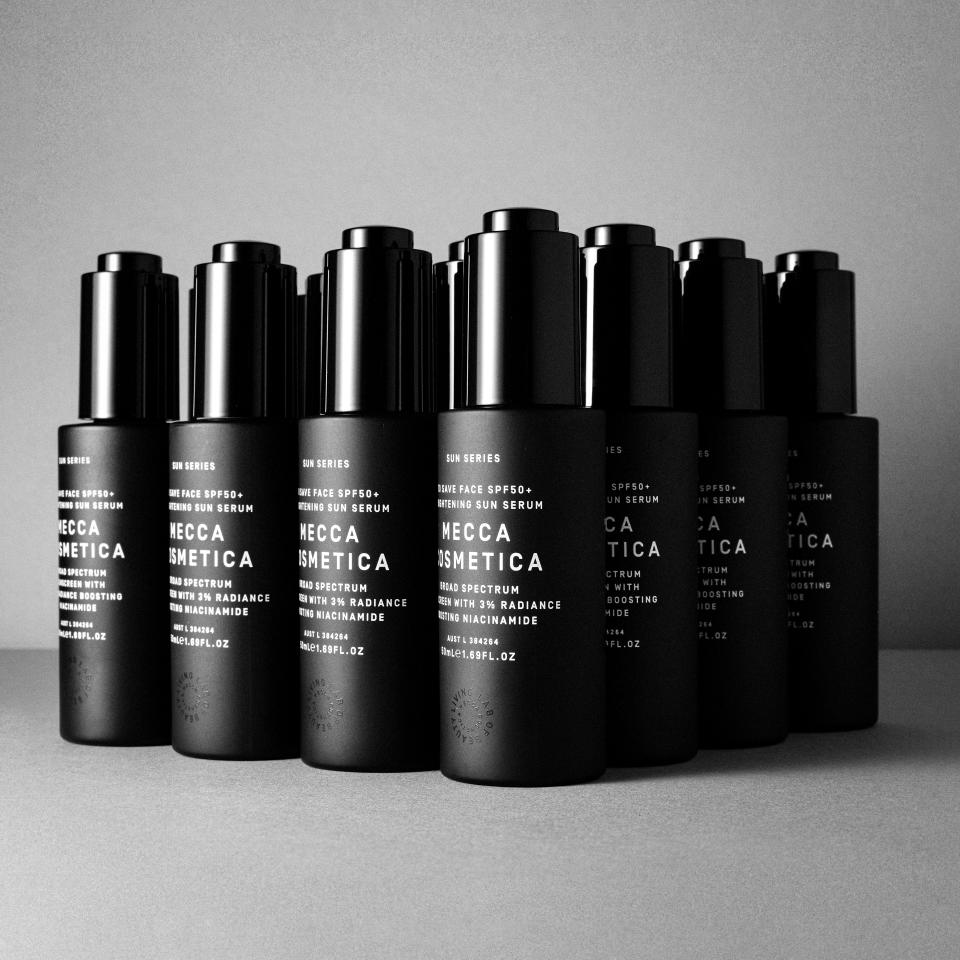
Do they have legs internationally?
J.H.: I like to think if we put our minds to creating product that is worthy of our customers, we would have to set ourselves a standard that it would be worthy of customers anywhere.
Are they an important part of the strategy for global differentiation? As we’re in the process of pondering what we should do, anything that differentiates us is a lever.
Our intention has never been to make the signature lines enormous powerhouses in terms of sales and share. It has always been to be additive to our global portfolio that offers the best in beauty. Our role is to make sure our customers have everything they need for a comprehensive shopping experience.
So building and driving our signature line business has not been a priority. Keeping our brands and customers happy is the priority.
How would the affiliate model work on an international level?
J.H.: We have to throw everything up into the air and work out what our strongest levers are. I think our strongest levers are our obsession with the customer, our ability to build an extraordinarily knowledgeable and engaged team who provide a completely differentiated experience and to provide a shopping environment that feels more like a home interior that you would love to hang out in as opposed to a transactional retail environment.
How do you think about the role of the store today?
J.H.: I believe retail is going to go further to seamless transaction on the one end and absolutely completely experiential on the other. Mecca sees its role as providing a highly engaging, multiple touchpoint experience that is personalized to each customer in store.
Yes, of course a customer can run in and self-navigate and process it quickly and they can do it through click-and-collect or endless aisle or use their app. But every business has to have a soul and know what it can absolutely excel in, and for us, it is providing customers with this all-consuming experience.
How has that been manifested in the Sydney flagship that you opened during COVID-19?
J.H.: The Sydney store is about 18,000 square feet, three times the size of our biggest store and nearly eight times the size of our average store. We had to build it without being able to visit it once because we were in lockdown in Melbourne.
We were clear about what we wanted to offer. Yes, we wanted the very best in color and skin and fragrance and hair and body, and we were clear we needed to tease out the edges and say what is beauty about now? It’s also about health and wellness, about experiences.
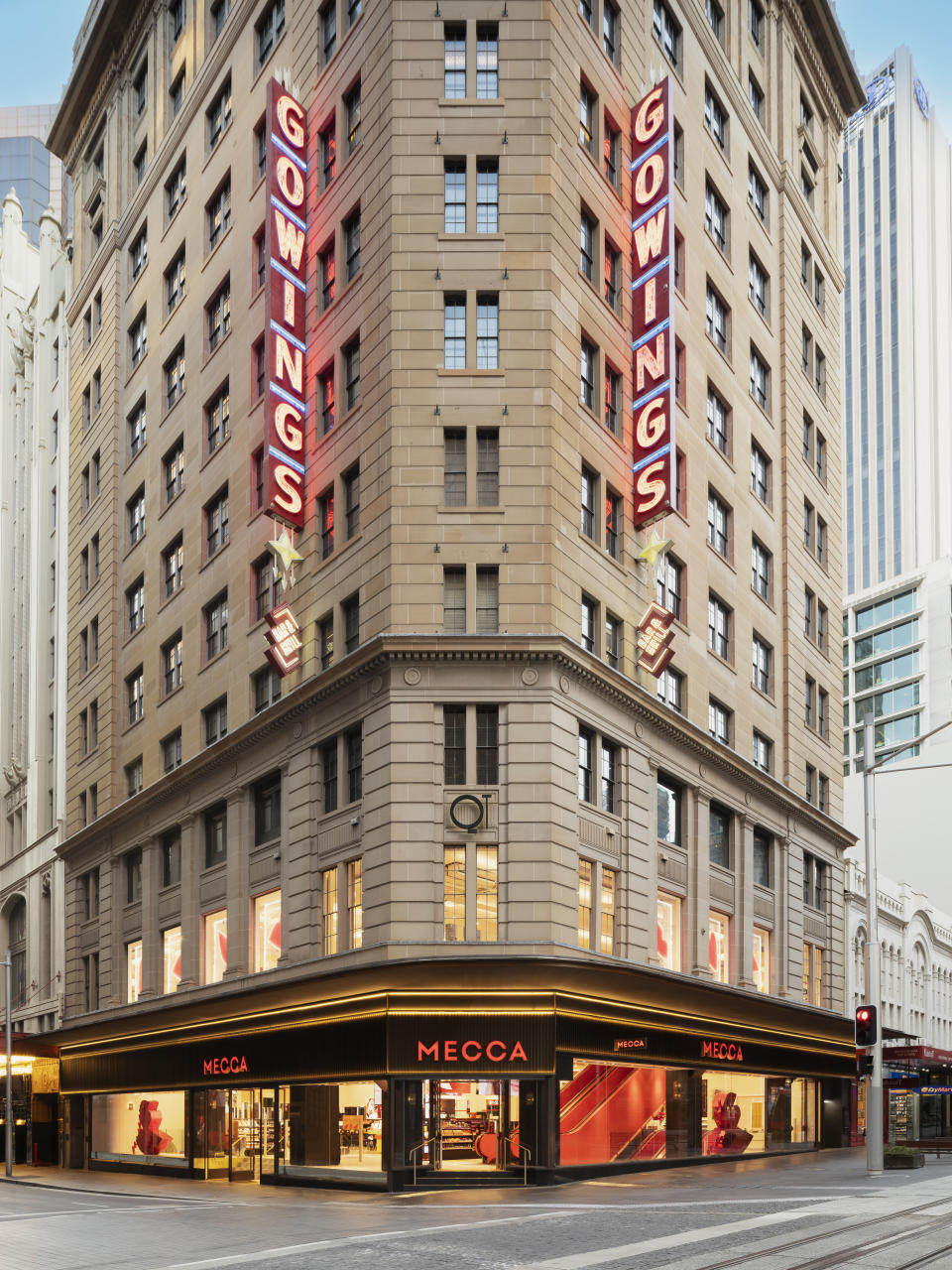
That helped us say — OK, in color, we’re going to have not only our entire offer, with big makeup stations on the ground floor for applications, but we’re going to have our Beauty Lab where 12 people can have half-hour beauty lessons on the hour every hour, like the Apple Genius bar. We also have a studio on the first floor where you can have makeup done whilst having your hair and nails done at the same time.
With skin, we have semi-private booths, where you can have boosters, half-hour walk-in sessions, but we also have three skin care rooms upstairs, where we do everything from injectibles to dermal therapies to peels. Our customers want the dermatological treatment, they want the product, they want the quick fix.
Based on this, we’re launching MeccaAesthetica as a stand-alone trial in Melbourne. It’s our take on a dermal clinic, with retail up front, chairs in the front for the shorter treatments and larger rooms for full derm treatments.
Going back to Sydney, we put hairstyling in and that has grown into a burgeoning business of its own. With health and wellness, we have a naturopath who comes in. We had a top spa do a three-month incursion so they can connect with clients.
We think beauty is also becoming a very social environment, so we put in a Pommery Champagne bar. Then we said, can we expand this through to jewelry as adornment, so we’re doing piercings, solderings, engraving.
Mecca is becoming more of a gifting environment, so we have a whole gift bar, where you can choose different papers and ribbons and wrappings. We really tried to think through every way a customer wants to interact with product and brands.
Early next year, you’ll open an even larger store that’s 40,000 square feet in Melbourne. What did you learn?
J.H.: In its first year, the Sydney store easily surpassed our goals, and it just shows that if you give customers what they may not ever know they want, but if you give them something they love, they will follow you. That has given us enormous confidence for Melbourne.
To fill 4,000 square meters successfully you have to be curious by nature, beauty obsessed, willing to test and trial and willing to go out there to find the beauty truffles and nuggets hidden wherever they may be.
We’re taking an agile approach, because we’re very cognizant that the beauty landscape is ever changing at warp speed — and it’s our job to predict where it’s going and to make sure we can continually adapt and evolve to always be ahead of the market.
When you started, the brands were really the differentiator, and now that the distribution landscape is democratized, the experience is.
J.H.: I think it’s really fascinating. Over time it became clearer and clearer what you are, what you are not, what your customer proposition is and should be, what you should double and triple and quadruple down on, and as competition enters a market, it makes you focus even more on your differentiators and how you create the tightest, most compelling relationship with your customers.
Transactional retail was never our bag, but over time we have pushed the boundaries on experiences and our customers have followed us on that march, where 35 percent of our space in the new flagships are service-oriented offers, because that is what our customer wants.
The next piece in the puzzle is that because there are so many brands launching and multiplying, your ability to edit the lineup and your point of view becomes even more critical, as is your ability to annunciate its differentiating factors. The precision of information you present and the way in which you do so becomes a critical part of the curation process.
So, having the brands become the baseline of your offer and it is what you do to bring them to life, the experience, the team, the content and the way in which you know your customer and how sticky you can make your relationship with your customer, that becomes the differentiator.
The only reason for us to expand more broadly is if we genuinely believe we can provide a differentiated and more compelling experience to customers and platform for brands. That’s at the heart of what we obsess about every single day.
There is so much volatility today in macro terms — the economy, culture, politics, etc. What impact is this having and how do you mitigate it?
J.H.: We feel we’ve weathered really significant events to date — we had to tap dance through a global financial crisis in 2008 when we were much smaller. We had to pivot and pivot to the point of pirouetting through the pandemic. As the macro headwinds come to buffet us, if we stick with a laser-like focus to listening to our customers, and we’re agile in our response, we’ll look to weather those headwinds.
As you’ve grown, how have you maintained that agility?
J.H.: Jim Collins enunciated the spirit of Mecca when he said our mantra is wake up, breathe, innovate. It is so deeply embedded in our DNA that when people join Mecca, they are slightly stunned by the whirling dervish nature of continual evolution and innovation, and the willingness to try different things and the pace that the organization runs at. The downside is it is more chaotic than other organizations.
Our philosophy is to try many different things in a small way and see what sticks, and once you really understand, then fire the massive cannonball. One of our mantras is Fail Fast, Fail Forward. We say a lot that if we’re not failing at things, we’re not pushing ourselves hard enough. We share our failures as a badge of honor of learning, so that no one else makes the same mistake and we can bank it in the knowledge vault of Mecca and it helps inform future tests and trials.
It’s also acknowledging that as you get bigger, you do need to bring a more disciplined approach to ensure that innovation remains in the business, so we have a concept innovation team working across everything from services and service providers through to categories to totally new concepts.
Then it comes back to the disciplined march of being able to roll it out and execute it effectively across your suite of stores to make sure the innovation touches every customer and sweeps up every brand in some way, shape and form.
How would you describe your leadership style?
J.H.: One, I try and plant a flag as to where I think we all should go. Two, I try and surround myself with incredible people who have the agency to debate whether that is the right flag and once we agree we’re all in, I watch them go forth with profound admiration for what as a team is done and delivered. The other thing is I try and bring a real sense of optimism and a belief that there is a way, we just collectively have to find it.
I try to make sure we have a really good time on the way through. Beauty is meant to be fun and fabulous and empowering. That’s what we’re meant to offer our customers, so if we can’t live that ourselves, what are we doing?
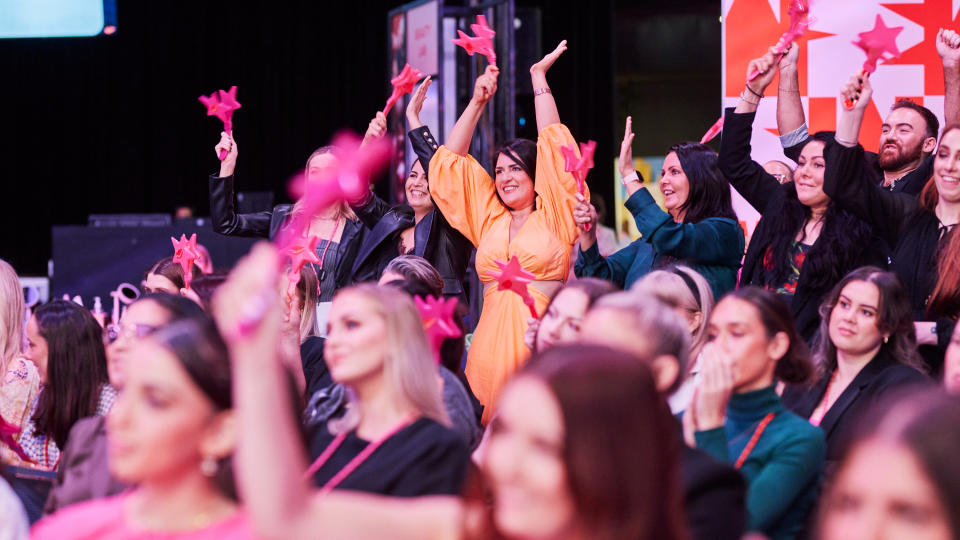
Sometimes I use the analogy that my role is to act as the ice smoother in the game of curling. I feel like everyone is out there trying to get their stone to hit the target and my role is literally to shine the ice in front of their stone so madly that, even though at times I might be a hot sweaty mess, if I do my job properly their pucks hit the target.
How has your role in the business changed as its grown? What’s your primary focus today?
J.H.: I have three “rocks” at any given time. Currently, the first is Mecca’s culture and that has become even more important coming out of COVID-19, at a time when there is culture erosion because we could literally not get together for two years.
Getting people connected, back into stores and the support center, really deepening the cultural beat of Mecca, ensuring people are engaged, happy, flourishing and thriving, is my first rock.
The second is how does Mecca find a truly differentiated approach to digital. How do we change the game in digital.
The third is the Bourke Street Melbourne flagship. It is an enormous undertaking, because of the size, the amount of innovation, the number of customers and the sales that we’re targeting, and, even more importantly, the profound impact it can have on our overall portfolio of stores.
What are you looking at digitally?
J.H.: Our mission is to humanize digital. What that means for us is to ingegrate the incredible service our hosts offer in store and work out how to do that in the digital arena. We also need to integrate digital into the in-store journey, and blur the lines between physical and digital. The last piece is how do we improve the booking journey, the pre- and post-appointment care and make services more personalized.
As the business continues to grow even bigger, do you plan on remaining independent?
J.H.: A true advantage and key differentiator is that we are independent. During tough times like 2008, we didn’t need to react by reducing investment or cutting staff — we didn’t have quarterly results to report or private equity partners. Those moments allowed us to really accelerate our stickiness with customers. We also love what we do — it’s exciting and exhilarating and we feel a sense of purpose and contribution. That is pretty irreplaceable.
You’re receiving the Beauty Inc Pete Born Impact Award. What do you think your primary impact has been?
J.H.: What I try and do day in and day out is to show that it is possible to run a female-empowering business in a positive, upbeat, fun way and demonstrate that you don’t have to take on the traditional stereotypes of how to run a business or how to lead. You can bring your whole slightly flawed, slightly zany, slightly learning-as-you-go self with all of the optimism and joy and curiosity and slight astonishment of where you are — with you. And you can be all of those things as you take this wild, wild ride.

